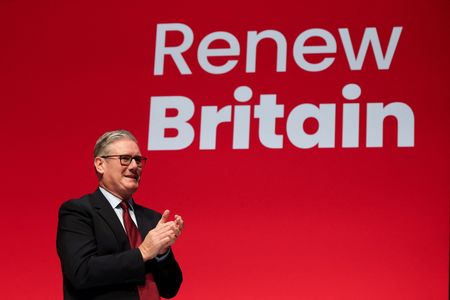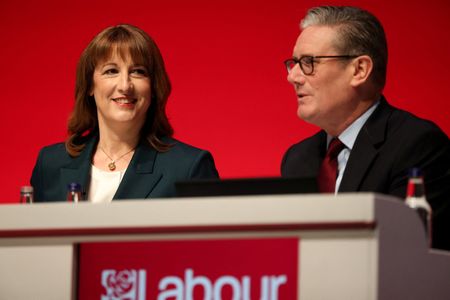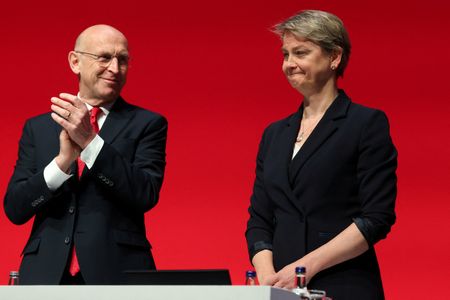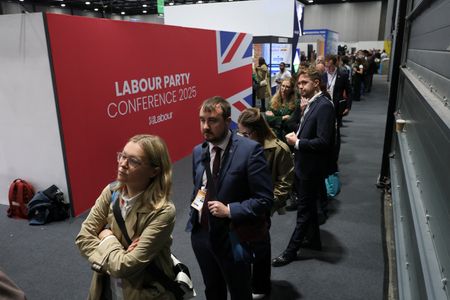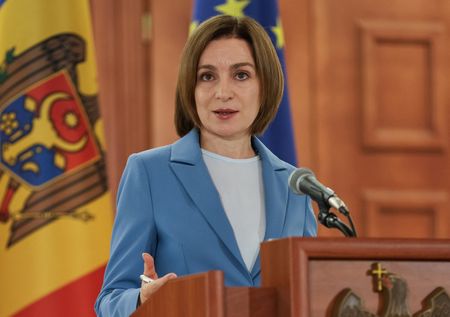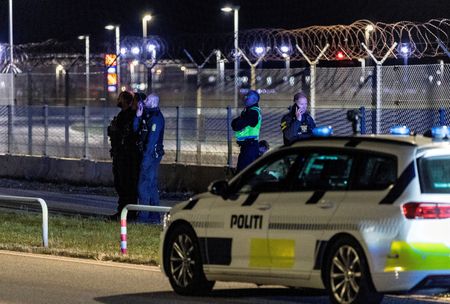By Elizabeth Piper, Andrew MacAskill and Alistair Smout
LIVERPOOL, England (Reuters) -Power has not been kind to Britain’s Labour Party.
Little over a year since a landslide election win, few at its annual conference in the northern city of Liverpool are celebrating: instead most are wondering where they went wrong.
With the populist Reform UK party running way ahead in polls, several Labour lawmakers fear they have lost the support of many Britons and worry they have little chance of winning them back before the next election due, at the latest, in 2029.
At least half a dozen lawmakers have openly blamed the government’s messaging for failing to engage voters, while others said ministers should be bolder with policy and do more to shake up the system to dent the growing popularity of Brexit campaigner Nigel Farage’s Reform.
LABOUR RISKING WORKING CLASS SUPPORT
“The rise of Reform is to do with us ceding ground to them, ceasing to be able to talk to the working class in the way they understand it and connect with it,” lawmaker David Smith said at an event on the sidelines of the centre-left party’s conference.
“We have to start re-engaging with the working class, we have to listen to what they want and we have to speak their language.”
That perceived inability to appeal to what was Labour’s traditional support base has prompted some soul-searching at its second party conference since winning power, with some lawmakers openly criticising Starmer’s Downing Street operation.
The British leader has lost at least 15 ministers and trusted advisers from his administration since late last year, some sacrificed in attempted re-sets of a government yet to convince voters it can rebuild the nation.
While Starmer struggles, Farage’s Reform has launched a recruitment drive, bringing in several former Conservatives to deepen the campaigning and organisational experience of a party on the fringes of politics for three years until last year.
Farage has forced the government’s so far unsuccessful efforts to tackle illegal immigration to the top of the agenda, prompting Starmer to try to rally his party to unite and attack what he sees as Labour’s main enemy, Reform.
TALK OF GROWTH DOES NOT APPEAL TO VOTERS
Labour lawmakers worry that Starmer’s team has become more reactive, than proactive, while it pushes a narrative about economic growth that has little resonance with politics-weary voters.
Margaret Mullane, the Labour lawmaker for Dagenham and Rainham, among the most deprived constituencies in Britain, described knocking on thousands of doors to speak to voters.
“And do you know what? No one has ever said to me, ‘Margaret talk to me about GDP’ (gross domestic product),” she said.
“But people do notice their high street banks closing, all the decent shops being boarded up, no police, they don’t feel safe and they don’t see solutions from politics really.”
The government is expected to have to put up further taxes at its next budget on November 26, which could drag on the economy.
Labour officials have tried to paint Reform as the party of grievance, offering voters a chance to vent their dissatisfaction with the state of the nation but offering few, if any practical solutions. They dismiss much of its policy platform as unworkable and uncosted.
REFORM SAYS STARMER’S ‘RACIST’ COMMENT IS BELITTLING
Starmer on Sunday called Reform’s immigration policies “racist” – a comment Zia Yusuf, head of policy at Reform, described as belittling the concerns of millions of voters.
“I think the people … are sick and tired of having their perfectly legitimate concerns about immigration being belittled and being smeared and being insulted,” Yusuf told Sky News.
Claire Ainsley, Starmer’s policy chief in 2020-22 and now working on centre-left renewal at the U.S.-based Progressive Policy Institute, questioned why Labour was focusing on immigration “when you know you’re never going to sort it out”.
That was a question that dominated several conference events, where lawmakers and activists said Labour should focus on delivering jobs to Britain’s less wealthy areas and urged Starmer to welcome new ideas, rather than shutting them down.
Andy Burnham, Labour’s Manchester mayor who has done little to hide his criticism of Starmer, prompting suspicions of a leadership challenge, said he wanted the party to be open to debate over how it can change its fortunes. But he questioned whether that was possible when “you have a climate of fear”.
He blamed Labour for suspending lawmakers “for liking a tweet by another political party” or for trying to protect disability benefits or extend child welfare support.
“I think we do need to have a debate about a policy agenda that connects more, that tells a story … about what the government is trying to do and deals with those basics, the cost of living, the cost of all those things.”
(Writing by Elizabeth Piper; Editing by Kate Holton and Andrew Cawthorne)

